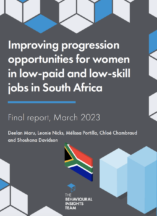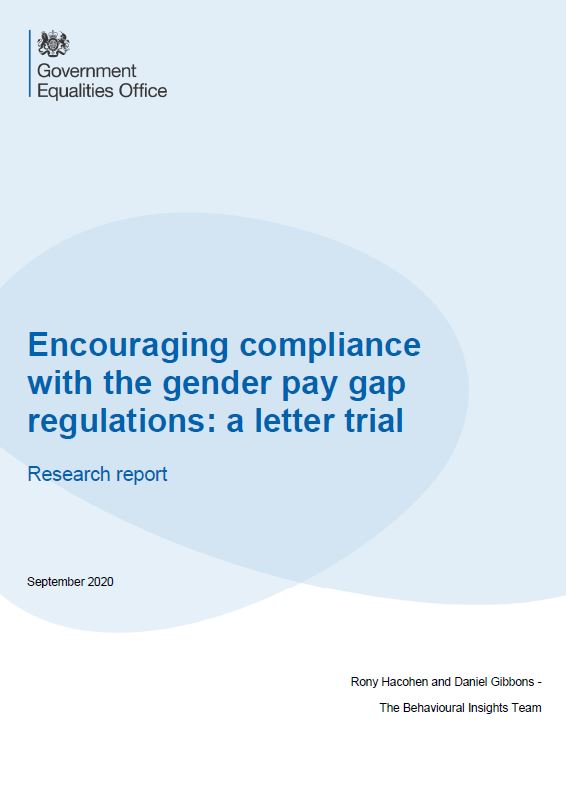Executive Summary
This report presents the findings of a research programme on the barriers faced by women in low-paid and low-skill work in South Africa, alongside potential solutions. The research, conducted by the Behavioural Insights Team (BIT), was part of a global research programme focused on South Africa, the UK, France, and Spain. Our work included a review of existing literature, a survey of 961 low-paid workers, 6 in-depth interviews with low-paid women, and a co-design workshop that brought together a range of charities, advocacy, and research organisations.
Below is a summary of the barriers we uncovered alongside interventions with the greatest potential.
Job-related barriers to progression
Safety: An unsafe working environment was the top selected barrier by low-paid women that we surveyed. One woman we interviewed stated: “Security, there must be tight security even when people think of robbing you they must think twice because they know that there is tight security there.”
- Safety checks or reviews of an organisation by an external reviewer: External reviews of an organisation can help women to know in advance whether a location is safe and may encourage the organisation to improve if it scores poorly.
Flexibility and predictability: Flexible working arrangements are particularly important for women, as they are disproportionately responsible for unpaid work such as childcare and household work. This burden can be especially challenging for low-paid women, who may be less able to afford formal childcare. Predictability is often overlooked; for low-paid women we interviewed it was important they could plan their commute and ensure they could return home safely.
- Shift swapping & scheduling: Advance scheduling to improve predictability and technologically-enabled shift swapping to allow workers to swap shifts with other workers without requiring manager approval.
Job security: Low-paid roles are more likely to be precarious. Women are overrepresented in the informal economy in low-paid and low-skill work. Informal work limits access to welfare and does not entitle workers to minimum wage. South Africa has one of the highest unemployment rates in the world, particularly for black women contributing to precarious work and few progression opportunities.
Commutes: Public transport often has issues of punctuality, overcrowding and breakdowns. Women may favour roles with a smaller commute over higher-paying roles in order to be closer to home to carry out domestic responsibilities. They are also more likely to encounter safety issues when commuting.
- Subsidised transport: Subsidised or free transport provided by employers may help women to access a greater range of job opportunities.
- Loaning transport costs: Offering loans to employees to cover transport costs (e.g. for the first month) can encourage women to apply for jobs they may otherwise have not been able to initially afford.
Organisational processes: Recruitment and progression practices can unintentionally provide greater opportunities for men than for women.
- Increasing transparency in recruitment decision-making: Reducing bias in the selection process
- Default employees into applying for promotions: Where employees have demonstrated that they are ready for promotion against set criteria, they are automatically put forward in the next promotion cycle, without having to apply or be nominated.
- Encouraging employees to obtain reference letters: By increasing the number of reference letters obtained, women are more likely to be successful in job applications.
Personal barriers to progression
Financial stress: Women in low-paid roles often have to manage financial stress, which gets in the way of progression opportunities. One low-paid women we interviewed stated: “It is very worrying, sometimes you would be sleeping and that thought comes into your mind, and you become sleepless, thinking.”
- Increasing pay frequency: Splitting pay into smaller and more frequent payments, for example paying fortnightly rather than monthly.
- Take-home pay transparency: Providing greater clarity to employees about the amount they would expect to earn if they were to work all their allotted shifts in the upcoming pay period.
- Free access to mobile data: Providing free access to internet data to help women find jobs and access training.
Skills: The evidence on the effectiveness of training is mixed, however, more training or upskilling opportunities was the top selected factor that both women and men thought would help them prepare for progression at work.
- Improve workplace training: Improving both the training itself and access to training.
- Use signalling devices to legitimise and endorse candidate skills: certification of skills may lead to more successful job applications and increased earnings.
Domestic responsibilities: Women carry out, on average, 60% more unpaid work than men. Childbirth extends the pay gap between women and men. There is currently very low uptake of parental leave by eligible fathers, likely due to perceived gender and social norms. Child-related financial support can be difficult to access.
- Access to funded childcare in the workplace: Employer-provided childcare can help women to balance work and domestic responsibilities, allowing them greater opportunities for progression.
- Improve access to child-related financial support: Providing further information to people on how to access child-related financial support.
We welcome the opportunity to collaborate with employers and research organisations to:
|








